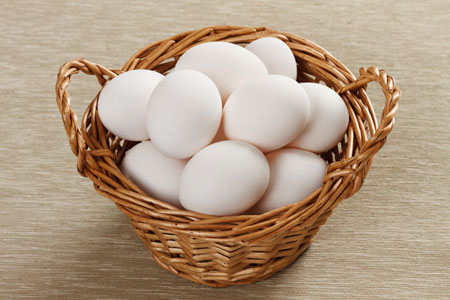
Before refrigeration became commonplace, submerging eggs in water glass was the preferred method of storage. Water glass, also known as sodium silicate, is a glassy solid (silicon dioxide) that dissolves in water. It has numerous industrial uses, including as a food preservative and a desiccant (silica gel pack) to protect delicate items from absorbing moisture. Liquid water glass is a syrupy, concentrated solution of sodium silicate. It’s primary use by homeowners is to seal concrete.
Similarly, the purpose of liquid water glass as an egg preservative is to seal the shell’s pores to minimize evaporation from the egg and inhibit bacteria from entering. Water glass imparts no taste or odor. It causes a silica crust to develop on the outside of the shell, but does not penetrate the shell.
How to Use Water Glass
Water glass only fresh eggs, the same day they are laid. Candle the eggs to eliminate any with blood spots or meat spots. Use only clean (not cleaned) eggs that are free of cracks. Place the eggs, pointy end down, in a scalded glass jar, stoneware crock, or sterilized food grade bucket with a tight-fitting lid. A 1-gallon jar or bucket will hold about three dozen eggs.
Combine 1 part water glass to 10 parts boiled, cooled water and mix thoroughly. Insufficiently diluting the solution will cause it to gel, making handling the eggs difficult.
Slowly pour the cooled liquid over the eggs until the solution covers the eggs by at least 2 inches. Do not save leftover solution. Seal the container with the lid to prevent evaporation.
If you don’t have many eggs at one time, continue adding eggs and fresh solution until the container is full. Always make sure the solution is at least 2 inches above the topmost eggs.
Store the container in a cool place where the temperature is above freezing but preferably not higher than 40°F. When you’re ready to use an egg, remove it from the container and rinse it off.
At 35°F, eggs in water glass will keep for six months or more. Even at a temperature as high as 55°F, eggs in water glass will remain satisfactory for cooking for several months.
Caveats
While working with water glass, take care not to spill any. Scrape off and wipe any spills immediately. Water glass is an adhesive that sticks fast once it has dried.
Sodium silicate is alkaline and can cause chemical burns. As a precaution, wear disposable waterproof gloves and safety goggles when handling water glass. Thoroughly wash your hands afterward.
Water glass is harmful when swallowed. Be sure to thoroughly rinse eggs stored in water glass before using them.
If you’re wondering if sodium silicate is okay to pour down the drain, consider that most of the major brand drain cleaners include sodium silicate. It inhibits or reduces corrosion in PVC and metal pipes by forming a protective glassy film.
Under the best storage conditions, eggs lose some of their fresh flavor and become bland tasting over time. The whites will eventually get thin, and the yolks will flatten when cracked into a pan, making them less suitable for frying or poaching than for scrambling or incorporating into recipes. Regardless of their age, a good idea is to crack each egg into a cup or small bowl before using it, to be sure it still looks and smells fresh.
Is Storing Eggs in Water Glass Safe?
Pennsylvania State Extension says: “We cannot recommend the use of water glass since the safety of products preserved using this ingredient has not been evaluated scientifically.”
On the other hand, Oregon State Extension says: “You can extend the shelf life of eggs by storing them in a compound known as water glass.”
Numerous anecdotal accounts of families that stored eggs in water glass in the past, or that currently do so, may be found online. They indicate that the practice is safe and keeps eggs fresh for up to two years. But it bears repeating that the eggs must be same-day fresh and clean from the nest.
Refrigeration is, of course, the safest way to store eggs. But where refrigeration is not available, or is iffy, water glass offers an alternative.
And that’s today’s news from the Cackle Coop.
Gail Damerow is the author of Storey’s Guide to Raising Chickens.


I keep reading about using pickling lime to do the same thing. My concern is that I have just starting using the lime method and it seems the lime falls out of solution pretty quickly and I’m not sure the eggs are being protected. Any comments from people that have done this?